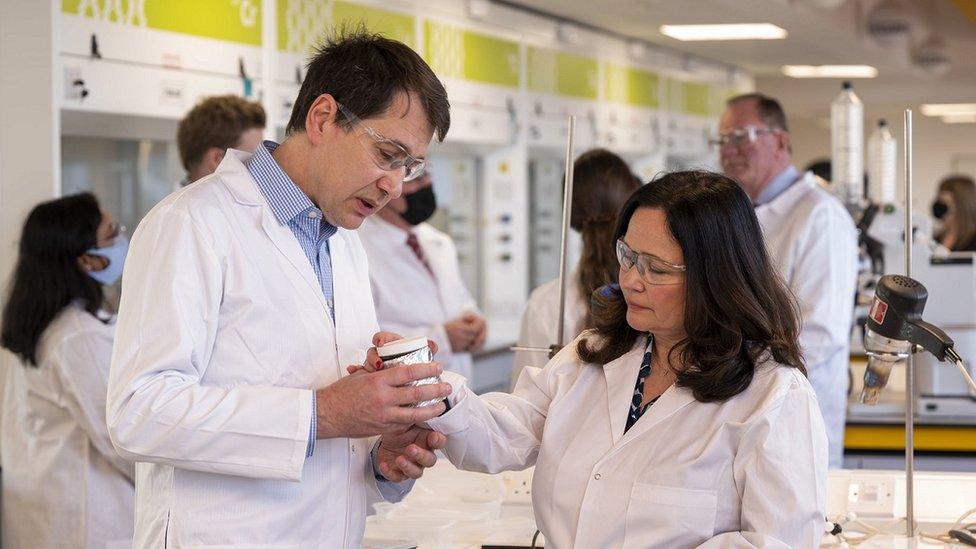Pret death teenager Natasha Ednan-Laperouse's parents launch allergy study
- Published

Natasha Ednan-Laperouse died after eating the baguette bought from Pret at Heathrow Airport
The parents of a teenager who died from an allergic reaction to a Pret baguette have set up a clinical trial with the aim of "making food allergies history".
The trial will investigate whether commonly available peanut and milk products, taken under medical supervision, can treat food allergies.
It is hoped the results could help the NHS save money on allergy drugs.
Tanya and Nadim Ednan-Laperouse's 15-year-old daughter Natasha died from anaphylaxis in 2016.
Natasha, from Fulham, west London, ate an artichoke, olive and tapenade baguette bought from a Pret a Manger shop before a flight at Heathrow Airport.
She began to feel ill during her flight, and suffered a cardiac arrest. Despite her father administering two EpiPen injections, she died later the same day.
The sandwich did not have any allergen advice on its wrapper because this was not required by law as it was made on the premises.
Her parents successfully campaigned to introduce Natasha's Law in October last year, which requires full ingredient and allergen labelling on all food made on premises and pre-packed for direct sale.
The couple have now set up a £2.2m trial to investigate a treatment for food allergies.
It hopes to show that people with food allergies may no longer have to avoid foods with small amounts of allergens due to production, and also may be able to eat popular food like cakes, curries and pizza.

Natasha's parents said they were "delighted" at the launch of the trial
The study will recruit 216 people between the ages of three and 23 with an allergy to cow's milk, and aged six to 23 with an allergy to peanuts.
Participants will undergo an initial 12 months of desensitisation to either milk or peanuts under strict medical supervision, and will be followed for two more years to provide longer term data.
Natasha's father said the trial was "a major first step in our mission to make food allergies history", while her mother said they were determined that Natasha's death "should not be in vain".
Mr Ednan-Laperouse said the study aims to prove that everyday foods can be used as a practical treatment for children and young adults with allergies "at a fraction of the cost to the NHS".
If successful, he said it would eventually enable people "to control their own lives and stay allergy-safe using shop-bought foods rather than expensive pharmaceutical products".
Co-chief investigator Dr Paul Turner, from Imperial College London, said the study heralds a new era for the active treatment of food allergies.
"For too long, we have told people just to avoid the food they are allergic to," he said. "That is not a treatment, and food-allergic people and their families deserve better."

What are food allergies?
Food allergies happen when the immune system mistakenly treats proteins found in food as a threat
As a result, a number of chemicals are released - it's these chemicals that cause the symptoms of an allergic reaction
Almost any food can cause an allergic reaction, but some are more common than others
It's still unknown why people develop allergies to food
Source: NHS

The trial has been funded by the Natasha Allergy Research Foundation, which has raised money from food businesses including Pret, Greggs, Tesco, Just Eat, Co-op, Morrisons, KFC, Sainsbury's, Costa, Burger King, Lidl and Leon.
It will be led by the University of Southampton and University Hospital Southampton NHS Foundation Trust.
They will partner with Imperial College London, the University Hospitals of Leicester NHS Trust, Newcastle University and Sheffield Children's Hospital.

A NATIONAL SCANDAL: A boy whose dream was twisted into a nightmare
FOUR MURDERS, FOUR DECADES: Investigating the aftermath of each unsolved case

Related topics
- Published1 October 2021

- Published28 September 2018
